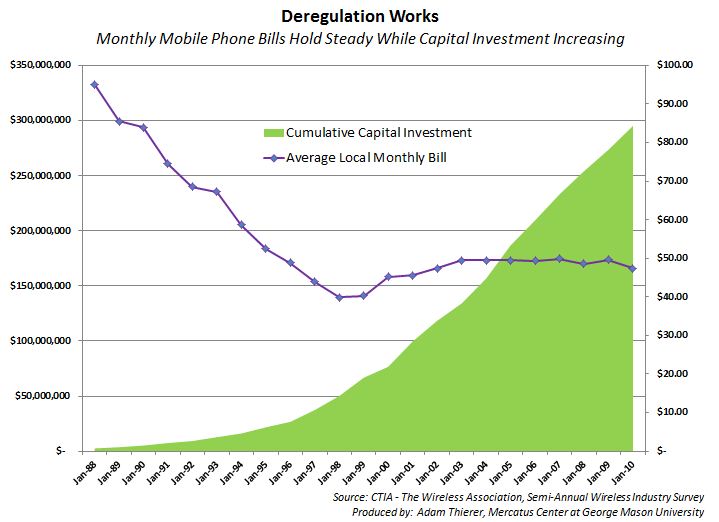Articles by Adam Thierer 
 Senior Fellow in Technology & Innovation at the R Street Institute in Washington, DC. Formerly a senior research fellow at the Mercatus Center at George Mason University, President of the Progress & Freedom Foundation, Director of Telecommunications Studies at the Cato Institute, and a Fellow in Economic Policy at the Heritage Foundation.
Senior Fellow in Technology & Innovation at the R Street Institute in Washington, DC. Formerly a senior research fellow at the Mercatus Center at George Mason University, President of the Progress & Freedom Foundation, Director of Telecommunications Studies at the Cato Institute, and a Fellow in Economic Policy at the Heritage Foundation.
[Note: This post is updated regularly as I discover relevant old or new material.]
“Regulatory capture” occurs when special interests co-opt policymakers or political bodies — regulatory agencies, in particular — to further their own ends. Capture theory is closely related to the “rent-seeking” and “political failure” theories developed by the public choice school of economics. Another term for regulatory capture is “client politics,” which according to James Q. Wilson, “occurs when most or all of the benefits of a program go to some single, reasonably small interest (and industry, profession, or locality) but most or all of the costs will be borne by a large number of people (for example, all taxpayers).” (James Q. Wilson, Bureaucracy, 1989, at 76).
While capture theory cannot explain all regulatory policies or developments, it does provide an explanation for the actions of political actors with dismaying regularity. Because regulatory capture theory conflicts mightily with romanticized notions of “independent” regulatory agencies or “scientific” bureaucracy, it often evokes a visceral reaction and a fair bit of denialism. (See, for example, the reaction of New Republic’s Jonathan Chait to Will Wilkinson’s recent Economist column about the prevalence of corporatism in our modern political system.) Yet, countless studies have shown that regulatory capture has been at work in various arenas: transportation and telecommunications; energy and environmental policy; farming and financial services; and many others.
I thought it might be useful to build a compendium of quotes from various economists and political scientists who have studied the regulatory process throughout history and identified regulatory capture or client politics as a major problem. I would greatly appreciate having others suggest additional quotes and studies to add to this list since I plan to update it frequently and eventually work all of this into a future paper or book. [Note: I have updated this compendium over a dozen times since the original post, so please check back for updates.]
The following list is chronological and begins, surprisingly, with the thoughts of progressive hero Woodrow Wilson…
Continue reading →
This week saw the release of another major government privacy report, this one from the Department of Commerce. The report called for expanded oversight and a new Privacy Policy Office within the Commerce Department. [Good summary of the report is here, and make sure to see Braden’s post about it here.] The Commerce Dept. green paper follows a report from the Federal Trade Commission (FTC) just a few weeks ago. The FTC report also endorsed a new regulatory framework, including a so-called “Do Not Track” mechanism to allow easier consumer opt-outs of online data collection and advertising.
Commenting on the gradual move toward a mandatory opt-in world for online advertising / data collection, Corey Kronengold of Digiday makes an argument that Berin Szoka and I have tried to develop here in the past. Namely, if government regulation “breaks” the implicit online quid pro quo currently governing online sites and services — i.e., that you get lots of free stuff in exchange for tolerating ads and data collection — then something must give. In all likelihood, that means paywalls will go up and prices will increase from zero to something higher. In his essay, “Taking Issue: The Value of Privacy,” Kronengold argues:
The value chain of online publishing is increasingly complex. And most consumers don’t have any interest in understanding the mechanics of targeting, data collection and re-selling, and ad revenue sharing. If continued access to free web content is what consumers are after, this has to change. Not participating in the value exchange is not an option. Yet we continue to struggle to explain. We need to do a better job of explaining the options and the consequences of those choices. When we can more clearly explain the benefits of allowing third party data to be bought and sold, users, and our government, are much more likely to allow us to continue to do so.
Continue reading →
 I really enjoyed this editorial in today’s Wall Street Journal by sci-fi novelist Orson Scott Card, author of Ender’s Game, among many other books. Card engages in some interesting soul searching about the impact of the Net and digital technology on our lives, economy, and culture. He concludes his essay by noting that:
I really enjoyed this editorial in today’s Wall Street Journal by sci-fi novelist Orson Scott Card, author of Ender’s Game, among many other books. Card engages in some interesting soul searching about the impact of the Net and digital technology on our lives, economy, and culture. He concludes his essay by noting that:
We’re still the same human beings we always were. Consumers still act like consumers; people still search for love and friendship. But the Internet has freed us from the boundaries of distance and many of the risks of embarrassment in social interactions. This re-sorted geography has brought its own pitfalls and forced us to create new rules of etiquette.
But just as I have no desire to give up cars, trains and planes to return to the hay-eating, vet-needing, poop-generating, one-horsepower horse, I don’t want to go back to pre-Google research, pre-Amazon shopping, pre-blog newsmedia, or the loneliness of villages limited by geography.
Quite right. Card is expressing the sort of “pragmatic optimism” I’ve written about here before in my essays about the ongoing battle between Internet optimists and pessimists. I’ve tried to articulate a sort of middle ground position in this debate that embraces the amazing technological changes at work in today’s Information Age but does so with a healthy dose of humility and appreciation for the disruptive impact and pace of that change. As I’ve noted before, we need to think about how to mitigate the negative impacts associated with technological change without adopting the paranoid tone or Luddite-ish recommendations of the pessimists. Read Card’s entire essay to get a better feel for how we can begin to think in that way.
Wow, what a year for cyberlaw and information technology policy books! Both in terms of number of titles and the gravity of the books released, 2010 was one of the biggest years of the past decade (perhaps matched only by 2006 or 2008 in terms of significance). So, here’s my annual list of the Most Important Info-Tech Policy Books of 2010.

First, however, as is the case each year [see my 2008 & 2009 lists], I need to repeat a few disclaimers. First, what qualifies as an “important” info-tech policy book is highly subjective, but I would define it as a title that many people — especially scholars in the field — are currently discussing and that we will likely be referencing for many years to come. But I “weight” books in the sense that narrowly-focused titles lose a few points. For example, books that deal mostly with privacy issues, copyright law, or antitrust policy do not exactly qualify as the same sort of “info-tech policy book” as other titles that offer a broader exploration of policy issues / concerns. For that reason, “big picture” info-tech policy books tend to rank higher on my lists.
The second caveat: Merely because a book appears on my list it does not necessarily mean I agree with everything in it. In fact, as was the case in previous years, I found much with which to disagree in my picks for the most important books of 2010 and I find that the cyber-libertarianism I subscribe to has very few fans out there.
With those caveats in mind, here are my choices for the Most Important Info-Tech Policy Books of 2010. Continue reading →
 Every once and awhile it’s worth taking a step back and looking at the long view of how Internet policy developments have unfolded and consider where they might be heading next. We’ve reached such a moment as it pertains to efforts to police the Internet for copyright piracy, objectionable online content, privacy violations, and cybersecurity. We’re at an interesting crossroads in this regard since the prospects for successful cracking down on copyright piracy and pornography appear grim. Seemingly every effort that has been tried has failed. The Net is awash in online porn and pirated content. I am not expressing a normative position on this, rather, I’m just stating what now seems to be commonly accepted fact.
Every once and awhile it’s worth taking a step back and looking at the long view of how Internet policy developments have unfolded and consider where they might be heading next. We’ve reached such a moment as it pertains to efforts to police the Internet for copyright piracy, objectionable online content, privacy violations, and cybersecurity. We’re at an interesting crossroads in this regard since the prospects for successful cracking down on copyright piracy and pornography appear grim. Seemingly every effort that has been tried has failed. The Net is awash in online porn and pirated content. I am not expressing a normative position on this, rather, I’m just stating what now seems to be commonly accepted fact.
In the meantime, the United States is in the process of creating new information control regimes and this time its access to personal information and cybersecurity that are the focus of regulatory efforts. The goal of the privacy-related regulatory efforts is to help Netizens better protect their privacy in online environments and stop the “arms race” of escalating technological capabilities. The goal of cybersecurity efforts is to make digital networks and systems more secure or, more profoundly as we see in the Wikileaks case, it is to bottle up state secrets.
These efforts are also likely to fail. Simply stated, it’s a nightmare to bottle-up information once it’s out there. Continue reading →
This is a response to Nick Carr’s recent piece, “The Attack on Do Not Track,” in which he goes after me for some comments I made in this essay about the trade-offs at work in the privacy and online advertising debates. In his critique of my essay, he argues:
What the FTC is suggesting is that the unwritten quid pro quo be written, and that the general agreement be made specific. Does Thierer really believe that invisible tradeoffs are somehow better than visible ones? Shouldn’t people know the cost of “free” services, and then be allowed to make decisions based on their own cost-benefit analysis? Isn’t that the essence of the free market that Thierer so eloquently celebrates?
My response to Nick follows. Continue reading →
As part of what Politico’s Tony Romm calls this week’s “all-out online privacy blitzkrieg,” Rep. Ed Markey (D-Mass) announced he would be proposing legislation aimed at better protecting kids from the supposed evils of online “tracking” and marketing. Apparently, Rep. Markey’s effort will build on the “Do Not Track” proposal that is garnering so much attention this week.
Lost in the smoke surrounding that privacy blitzkrieg is an important distinction between these two proposals: There is a very big difference between re-engineering browsers and websites to comply with a “Do Not Track” mandate and a new regulatory scheme aimed at identifying the ages or identities of individuals using certain online sites or services. Namely, the latter likely necessitates some sort of mandatory age verification or online authentication regime for the Internet.
Let’s take a step back for some context. Markey helped author the Children’s Online Privacy Protection Act (COPPA) of 1998, which dealt with the collection of information for kids under 13 online. But COPPA wasn’t a strict age verification or online authentication regime for the Internet. Instead, COPPA mandated a “verifiable parental consent” regime which the Federal Trade Commission (FTC) later enforced using a so-called “sliding scale” approach. Essentially, sites that are “directed at” kids under 13 are supposed to get parental consent using a variety of mechanisms (credit cards, sign and fax forms, phone calls, etc) before any collection of information takes place. Of course, there are some devilish details here regarding what counts as “directed at” or “collection,” but the crucial point here is that COPPA does not require the formal authentication of web surfer identities or ages — whether they kids or parents.
So, the really tricky question here is how one goes about expanding the COPPA regulatory regime without stumbling into the legal thicket that tied up the Child Online Protection Act (COPA) of 1998, a law which did mandate such an authentication regime and, as a result, witnessed a grueling decade-long legal battle over its constitutionality. Ultimately, the courts rejected COPA as inconsistent with America’s tradition of anonymous speech, something central to our evolution as a democracy, pre-dating even the First Amendment that protects it from government interference. Thus, we have, at least for now, closed the book on COPA. But are we about to re-open it with COPPA expansion a la the forthcoming Markey bill? Continue reading →
There’s a sharp piece by Fred Wilson in the New York Times today pointing out the benefits of online “tracking.” It’s part of a series of essays in one of their “Room for Debate” series about the FTC’s new “Do Not Track” regulatory proposal. (Our own Jim Harper also has a good essay worth reading.)
In Wilson’s essay, “Tracking Personalizes the Web,” he argues:
“Tracking helps services like the Weather Channel give you the information you are looking for without having to enter a lot of data every time you use the service. Tracking can make sure you don’t see the same news story twice.
Tracking is the technology behind some of the most powerful personalization technologies on the Web. A Web without tracking technology would be so much worse for users and consumers.”
He’s right, “tracking” makes personalization possible–and much more effective. But the really important point here is the one I made early today in my essay on “No-Cost Opt-Outs & Online Content & Culture“: data collection and advertising drive the free online content, sites, and services we take for granted today. Personalization of all those things is great, but we might not have some (most?) of them at all without data collection and advertising, or we’d at least have fewer that were entirely gratis.
Free isn’t really free, people!
In his essay today, “Go On, Opt Out. Just Don’t Come Cryin’ To Me …,” John Battelle has some very sensible thinking on the “Do Not Track” idea and privacy regulation more generally:
Look, if you want to, you can put yourself on a “do not track” list in the Real World. As you walk around in our Real World, where small shopkeepers and Starbucks alike attempt to lure you into their stores, you can simply decide to ignore their come ons. You can refuse to get a grocery card, and forego the discounts they offer. You can forego the countless coupons, come ons, and catalogs that come through your newspaper, browser, or your community mailer, and if you work at it, you can even opt out through some specialized services (with more coming soon, if the FTC gets its way). And you can turn off your television (cause lord knows even the shows are trying to influence you now), and you can ignore your friends when they talk about the latest, coolest promotion that Verizon or ATT has pushed them through their cell phones. If folks insist on talking about stuff that might smack of someone selling you something, heck, you can start to dress like the Unabomber and withdraw entirely from our obviously commercial culture. You might look weird, but at least folks will leave you alone. And if you do, your world will either be better, or it will suck more. Your call.
But don’t come crying to me when you realize that in opting out of our marketing-driven world, you’ve also opted out of, well, a pretty important part of our ongoing cultural conversation, one that, to my mind, is getting more authentic and transparent thanks to digital platforms. And, to my mind, you’ve also opted out of being a thinking person capable of filtering this stuff on your own, using that big ol’ bean which God, or whoever you believe in, gave you in the first place. Life is a conversation, and part of it is commercial. We need to buy stuff, folks. And we need to sell stuff too.
Amen, brother. This is a point Berin Szoka and I have made repeatedly here in the past: The debate over privacy regulation is fundamentally tied up with the future of online content and culture. The idea of a cost-free opt-out model for the all online data collection / advertising may sound seductive to some, but we must take into account the opportunity costs of regulation. The real world is full of trade-offs and, despite what the Federal Trade Commission seems to think, there is no such thing as a free lunch.





 The Technology Liberation Front is the tech policy blog dedicated to keeping politicians' hands off the 'net and everything else related to technology.
The Technology Liberation Front is the tech policy blog dedicated to keeping politicians' hands off the 'net and everything else related to technology.